| Reviews & Columns |
|
Reviews DVD TV on DVD Blu-ray 4K UHD International DVDs In Theaters Reviews by Studio Video Games Features Collector Series DVDs Easter Egg Database Interviews DVD Talk Radio Feature Articles Columns Anime Talk DVD Savant Horror DVDs The M.O.D. Squad Art House HD Talk Silent DVD
|
DVD Talk Forum |
|
|
| Resources |
|
DVD Price Search Customer Service #'s RCE Info Links |
|
Columns
|
|
|
Daniel Boone - The Complete Series: The Fiftieth Anniversary
Perfect family entertainment for young and old...and that's next-to-impossible to come by these days. 20th Century-Fox, introducing a new releasing line called the TV Archives (a potential gold mine for lovers of vintage TV, don't you think?), is inaugurated with Daniel Boone - The Complete Series: The Fiftieth Anniversary, a 6-volume, 36-disc, 165-episode collection of the beloved NBC action/adventure series starring Fess Parker, Patricia Blair (pretty and bland), Ed Ames (lots of fun with his English colloquialisms and smirky reaction shots), Darby Hinton (all-American kid), Veronica Cartwright (excellent here--what a shame Blair got her fired), Albert Salmi (superfluous once Ames took the sidekick slot), Jimmy Dean (amiable, as usual), Dallas McKennon (funny old coot), and Rosey Grier (who was going to tell him he was trying too hard?). Daniel Boone proved a sizeable hit with families and young audiences during its six season run from 1964-1970, and it still plays quite well today, with its mix of agreeably idealized history (...which everyone involved in the making of series was well aware of), sprightly action, smooth performances (what else was Fess Parker if not effortlessly assured?), and a moral to send the kids off to bed on. No extras are included for these reasonable fullscreen black and white (first season)/color, pressed-disc transfers.
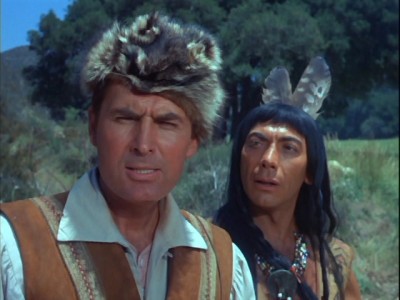
Way back in 2006, I wrote reviews for (now defunct) Goldhil Entertainment's releases of seasons 1 and 2 of Daniel Boone, which I watched with my family. So it was fun to receive this complete box set years later and look it over with some of my new younger kids who missed out the first time (predictably, they enjoyed it just fine). As I wrote in that first review, to my older brothers Fess Parker would forever be Disney's Davey Crockett, such was the impact of that baby boomer phenomenon on them. But for me, coming along more than ten years after the fact, the image of Parker frozen in my mind is that of Daniel Boone, no doubt from countless reruns of the series when I was growing up (who the hell from my generation didn't want to pick up that tomahawk, with "insert your name was a Man, Yes a Big Man!" playing in your head as you hurled it, splitting that log open like a chicken?). Fess Parker's career always intrigued me because, despite the "second phase" success of Daniel Boone, I could never quite figure out how someone as talented as Parker, who was given a global springboard like those five one-hour Disney Davy Crockett movies, didn't have a more substantial career on the big and small screens. Well...after some reading, I found out that Parker spent a lot of time wondering about that very same question himself.
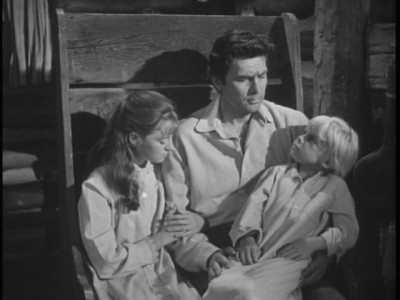
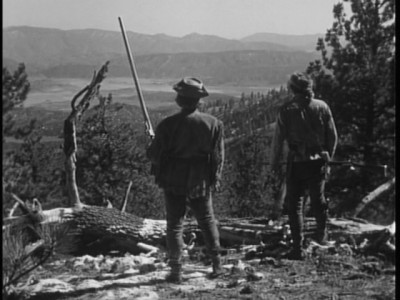
According to interviews with Parker, Daniel Boone was supposed to be The Further Adventures of Davy Crockett...but ol' Uncle Walt said, "No way." Parker, under personal contract with Walt Disney during the Davy Crockett period in the mid-50s, could never quite understand why his boss didn't do more with him at the studio, nor why Walt wouldn't loan him out for projects that could have upped Parker's profile (and one would gather, increase the value of Disney's "property"), such as John Ford's The Searchers (which Disney turned down for Parker without telling him) or Josh Logan's Bus Stop, with Marilyn Monroe. Indeed, Walt's first project for Parker after Crockett--a critical moment in Parker's career, since Hollywood was looking closely to see if he wasn't just a flash in the pan--was The Great Locomotive Chase...where lead Parker was hung as a spy at the big-screen movie's finale (thanks, Uncle Walt...). From there it was all downhill, as Walt either put Parker in desultory projects (Westward Ho the Wagons!, a small role in Old Yeller), or just ignored him. Fed up with the demand that he appear in a glorified cameo for Disney's Sal Mineo Western, Tonka, Parker quit Disney, and moved over to Paramount, where he fared little better (supporting roles in second-tier movies like The Jayhawkers! and Hell is for Heroes). Parker, going nowhere fast on the big screen, had little choice but to return to TV in NBC's small-screen adaptation of Mr. Smith Goes to Washington, which only lasted one go-around during the 1962-1963 season. So when NBC suggested Parker return to the role that had made him an international icon, the pragmatic Parker--now with a family to feed--readily agreed.
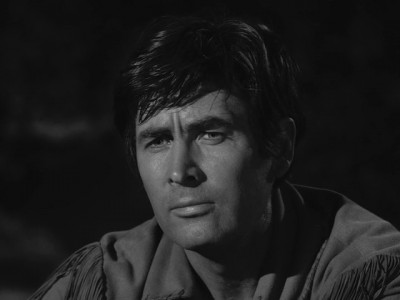
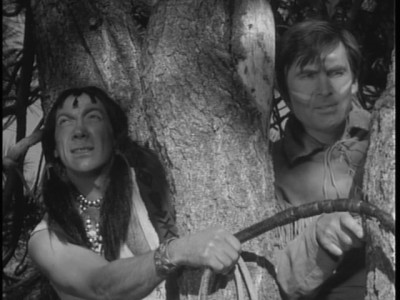
Too bad ol' Uncle Walt didn't feel the same way. When NBC let Disney know they were going to remount Davy Crockett for Fess Parker (which of course they had every legal right to, since you can't copyright the biography of a long-dead historical person), Walt--whose Walt Disney's Wonderful World of Color was one of the very few NBC shows in the Nielsen Top Thirty--let the network powers-that-be know he wouldn't be too happy with that proposed TV series getting a pilot (Parker, always the true gentleman, was nice about this, never publically stating that he thought Walt was being vindictive to an old employee who walked out on him...but I'm saying it). To their credit, NBC, badly in need of more hits in the face of CBS' increasing domination of the ratings, forged ahead and proposed that Parker keep his coonskin cap on and play frontier explorer Daniel Boone instead (even though Disney had done a Boone project in 1960 with Dewey Martin, he didn't push it by objecting to this conversion--probably because the Martin outing was a flop). Determined this time not to be a mere employee (indirectly, Walt made millions off Parker's tireless promotional efforts as a global spokesman for the entire Disney brand during the Davy Crockett craziness...while Parker was being paid a measly $350 dollars a week on his contract), Parker owned 30% of Daniel Boone, with old Hollywood pro director/producer George Sherman (Comanche Territory, Tomahawk), producer Aaron Rosenberg (To Hell and Back, 1962's Mutiny on the Bounty), and 20th Century-Fox as partners (according to Parker, he and Walt exchanged pleasantries during a Daniel Boone launch party...but Parker never heard from ol' Walt ever again). Shot in color but broadcast that first 1964-1965 season in black and white (from what I've read, the color masters are long gone), Daniel Boone didn't crack the vaunted Nielsen Top Thirty that first season (the debut of 18th most-watched The Munsters on CBS cut into their family demo...if viewers weren't already watching The Flintstones and The Donna Reed Show on ABC). But Boone often did well in its timeslot, and with networks back then being far more patient in letting a show find an audience, Daniel Boone survived that first season to come back in its sophomore session as the 26th most-watched show on television.
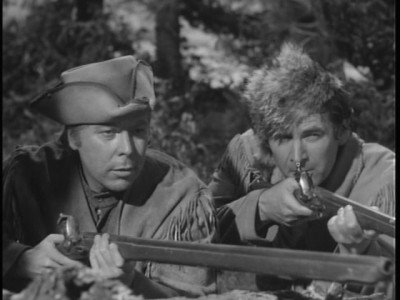
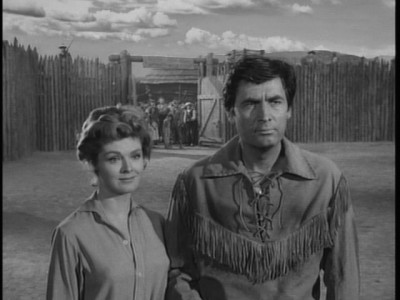
As I wrote in my 2006 review, and as I rediscovered watching the six seasons in this boxed set, what struck me almost immediately about Daniel Boone was the sense of fair-mindedness in Parker's portrayal of Boone, as well as in the series' overall even-handed viewpoint of its clash of cultures and peoples on the pre-Revolutionary War frontier. It's a decidedly un-P.C. approach to the material that may well puzzle those who have grown up in today's restrictive, locked-down politically correct culture (but it won't be for fans of vintage TV, who know better). It's solid, sensible entertainment, for lack of a better word, employing the classic (and perhaps now dead) American values of self-determination and self-reliance, regardless of your race or your creed or your religion. Daniel expects nothing more from anyone--Indian, Britisher, settler--than simple respect, and the right to pursue his individual and family life according to his own views, without anyone stopping him...particularly the ruling government (good luck with that today). And if that settler or Indian or Britisher violates that basic God-given right (and this from your atheist reviewer), Daniel tells them so--fearlessly--regardless of who they are. Of course, there are many people today who would say that's a ridiculous notion because we weren't equal as a nation during this time--that it's naive and even dangerous to believe Daniel Boone's open-minded "history lessons," not just from a facts-on-file view, such as historic figures in time-lines that don't make sense in the season's story arcs, but also from a sociological prospective (18th century characters with 1960s politically enlightened sensibilities).
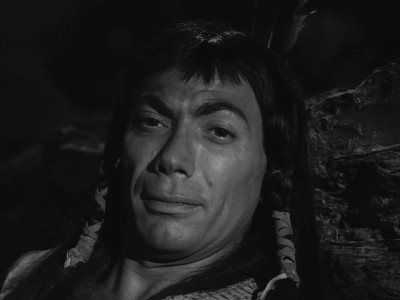
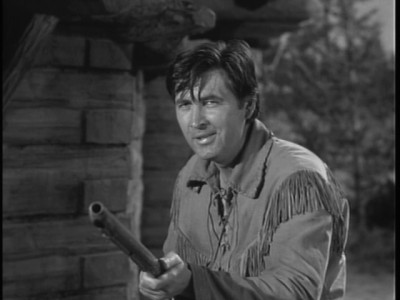
Of course the easiest answer to that kind of phony critical outrage or dismissiveness is that Daniel Boone was first entertainment, and second, "message"...and at no time was it an attempt at "real" history. I reject the elitist writers and "TV critics"--yeech--who wring their hands and bemoan those clueless masses being brainwashed into thinking "tripe" like Daniel Boone is factual and historical, and thus potentially capable of warping their sensibilities. TV viewers, then and now, are smarter than that (Parker hit it right on the head about the fantasy elements of Daniel Boone: "Well, thankfully, the American public sees entertainment for what it is, it's entertainment, it's not life, so we were able to spend six years on it."). That's particularly true with the dismissive criticism of the Mingo character (marvelously played by Ed Ames), with critics saying it was laughable to have an Oxford-educated Indian befriend Daniel as an unlikely sidekick. This critical carping strikes me as a far more racist viewpoint than the "evils" of the early seasons of Daniel Boone supposedly comforting early 1960s racist Americans (that viewpoint comes from one of the series' producers, by the way), by showing Indians--as well as American settlers and British soldiers, which is conveniently forgotten--who were treacherous. There's an interesting exchange between Daniel and Mingo in the first episode, Ken-Tuck-E, where Mingo talks of "God's many children with many tongues." He goes on to speak of his belief that "The red man kills to live; too often, the white man lives to kill." If this were a TV show today, Boone would agree with Mingo, and offer a contrite apology. Not so here. Daniel replies: "Some do; others don't." It's obvious they disagree, but they continue on with their friendship. You would never hear that sentiment today; it's de rigueur that any project today dealing with this particular time period in America history would have its characters divided between absolute evil (whites) and absolute good (everyone else).
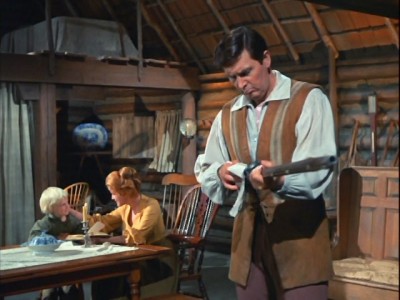
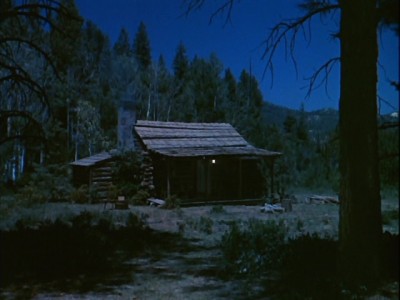
Daniel Boone, however, is more nuanced and thoughtful than that (today's TV may be more graphic or unflinching in the depiction of its dramatic themes, and thus perceived, somehow, to be more "honest" or "real" than television from Daniel Boone's more innocent days...but it's also almost exclusively one-sided in its perspective. And you know what side that is). In the second season episode, My Name is Rawls, co-starring Olympic decathlete and civil rights activist, Rafer Johnson, the then-white hot topic of race relations is tackled head-on (hardly seems like the kind of material for a "kiddie show," as Daniel Boone was often derisively labeled). Johnson, a former slave now free, is stealing other trappers' pelts to sell to murderous white thieves, to earn his passage back to Africa. Just the notion that Johnson wants to return to Africa is novel enough for 1965 television (most episodes would have demanded that he wish to stay here as a free man), but when the producer and writers gave him these words to say, it must have been a jolt to the families watching the show: "The white man took my freedom and brought me to this country. I want my freedom back. I want to see my home again. These are my rights. I'm claiming them the only way I can." But of course, it's never that simple, as Daniel points out. Setting out to track down Johnson for stealing the pelts, Daniel responds to the above by saying, "You make it sound sort of logical. The only thing is, by taking something that you say belongs to you, you're taking something that belongs to somebody else." When pressed further by Johnson, Daniel flatly states, "You might say I'm dead set against thievery." Throughout Daniel Boone's run, an even-handed approach is applied to this central issue of perceived rights versus larger responsibilities--both personal and societal, with Daniel and Mingo often making a case for racial harmony facilitated by an overriding moral code based on individual responsibility. When Daniel asks Johnson to trust him, that he doesn't want to send him back to the slave owners, Daniel says, "A man's what he is--regardless. I don't think race or color has anything to do with it." Johnson replies, "White men sold me into slavery; how could I ever be his friend?" Daniel, smiling along with Mingo, his Indian friend, responds sensibly, "Well, I don't like all Indians for that matter. Depend's on what you're looking for," while Mingo smilingly acknowledges this truism with a nod. It's this kind of honest, pragmatic, fair approach to difficult, controversial issues that's missing from our current one-sided entertainment culture (and frankly from our culture in general, in these here United States of Mexico), and which makes Daniel Boone a real revelation. Today, if a character uttered the words that Daniel said above, he'd immediately be labeled a racist, and the discussion would be over--a convenient way to shut down someone as "absolutely wrong" without having to hear what they're actually saying. But far from being a racist, Daniel goes so far as to protect Johnson over the safety of his own daughter, while securing the funds to send Johnson back to Africa...if he so chooses.
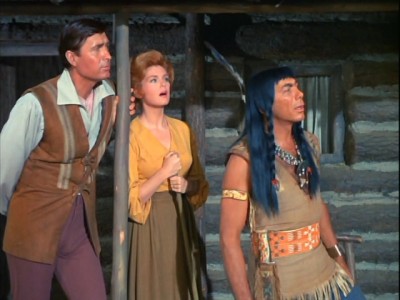
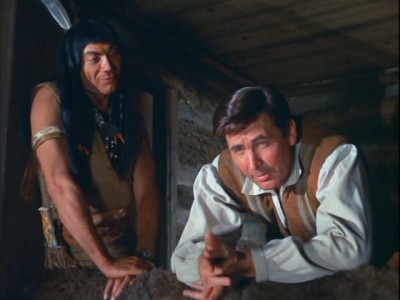
I highlighted these earlier episodes not just because they're excellent examples of Daniel Boone's thoughtful context within a family-friendly action/adventure format, but also to counter producer Barney Rosenzweig's (seasons 4 through 6) assertions--laid out to any interviewer who will listen to him--that Daniel Boone was lightweight garbage before he came along and "introverted" the series into something meaningful. According to Rosenzweig's interviews (watch his video one for the Archive of American Television to see exactly why so many people loathe the Hollywood Left), he was brought into the "troubled" production prior to the 1967-1968 season because the ratings were falling (not true) and that all he was instructed to do by his father-in-law...who just happened to be producer Aaron Rosenberg...was to shepherd the show through this fourth and certainly last season, so enough episodes would be ready for syndication. And the way he did this was to take a chance and make Daniel Boone relevant by "introducing ideas and thoughts to people who hadn't been exposed to them," specifically: teaching those poor unformed, unrealized boobs out in TVland about Vietnam, "civil disobedience, and the plight of blacks before slavery was abolished," to Fess' "huge audience in the South." Just re-read that again: Rosenzweig's Daniel Boone reached down into the fetid, illiterate swamp known as "the deep South," and taught those know-nothing racist crackers a thing or two about how America's history really was--specifically, about slavery...to the South that apparently didn't understand those ramifications over the last 100 years (I'm surprised he didn't throw in ol' Dan'l taking a bath every now and then so'in the viewer would know what a cake of lye soap was fer). Such unwarranted, elitist hubris condemns itself, but something should be said about his numbers, at least. When Rosenzweig was brought into the "failing" Daniel Boone, its ratings had done nothing but climb prior to his hiring: 26th overall for its sophomore season, and 25th for its third. Rosenzweig's first season as producer actually saw a four slot drop in the Nielsen's (29th) for the show's fourth season, before the fifth season rebounded to 21st (against zero competition, lucky for him), with the last season well out of the Nielsen Top Thirty against monster hit, Family Affair. Maybe Parker said it best; in his Daniel Boone interview for Archive of American Television, he lists his producers by name...before referring to Rosenzweig as "the 29-year-old son-in-law." Rosenzweig didn't make Daniel Boone "relevant." It already was. He may have made it more message-y, while cutting back the action (which wasn't wise in the long run)...but it was always entertainment with a thoughtful context.
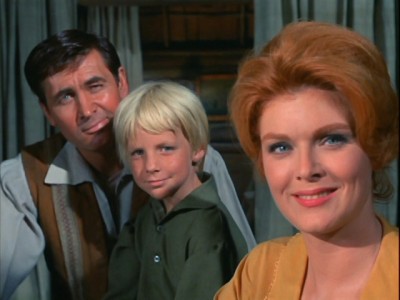
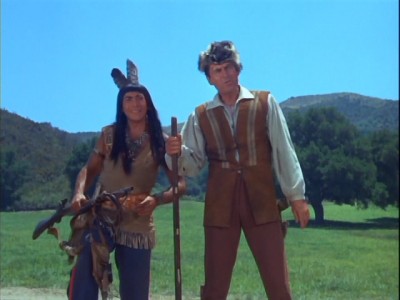
The Video:
First of all, for those wondering: these are pressed discs, not DVD-Rs. As for the fullscreen, 1.37:1 transfers: I did notice compression issues, particularly pixilation for the busier forest backgrounds, jaggies for the titles and end credits, and a softish image the higher you go up in monitor size (on my 65"...not so good). Is it a deal-breaker for these otherwise colorful transfers? No, not for vintage TV fans who are used to imperfect presentations.
The Audio:
No stereo reconfigurations from the previous releases--only a satisfying Dolby Digital English 2.0 mono track, with a decent re-recording level. No subtitles or closed-captions.
The Extras:
No extras for Daniel Boone - The Complete Series: The Fiftieth Anniversary.
Final Thoughts:
A smooth production, solid storytelling, a moral for the kids inbetween the action, and assured performances--what more do you want from family entertainment? Fess Parker, with that honeyed, mellifluous Texas accent and imposing 6 foot 5 stature, is the embodiment of what we like to think a classic American male is...or least what they used to be (God help us if the ideal now is a completely fried Matthew McConaughey, an oafishly dim-witted Tatum, or a gimcrack-charming, hiding-something Clooney). Daniel Boone, as idealized in Daniel Boone, is an iconic American role that requires gentle strength, few words that are nonetheless delivered well and with authority, and an absolute confidence in knowing that what you're doing, is right. Fess Parker is a natural at conveying this kind of American male--a figure in popular culture, I suspect, that is gone for good. I'm highly recommending Daniel Boone - The Complete Series: The Fiftieth Anniversary.
Paul Mavis is an internationally published movie and television historian, a member of the Online Film Critics Society, and the author of The Espionage Filmography.


|
| Popular Reviews |
| Sponsored Links |
|
|
| Sponsored Links |
|
|
| Release List | Reviews | Shop | Newsletter | Forum | DVD Giveaways | Blu-Ray | Advertise |
|
Copyright 2024 DVDTalk.com All Rights Reserved. Legal Info, Privacy Policy, Terms of Use,
Manage Preferences,
Your Privacy Choices | |||||||













